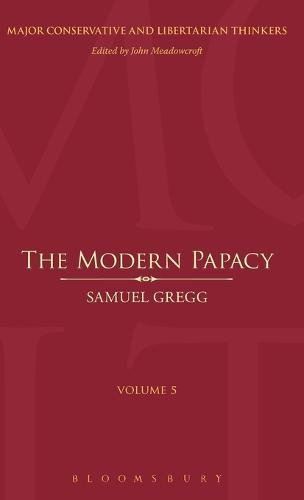Overview
Since the dawn of the Enlightenment, modernity and the Papacy have experienced a difficult though never severed relationship. The Modern Papacy goes beyond the caricatures to demonstrate how the popes - specifically John Paul II and Benedict XVI - have articulated a sophisticated critique of the post-Enlightenment world, one that acknowledges the real progress made in modernity while simultaneously highlighting its political and philosophical shortcomings. Far from falling on deaf ears, the nature of their engagement with the modern world has sparked criticism and praise from Catholics and non-Catholics alike - sometimes in surprising ways. Whether the subject is faith and reason, religion and the modern sciences, the roots and future of Europe, or the origin and ends of human freedom, John Paul II and Benedict XVI pose questions that simply cannot be ignored, regardless of whether one likes their answers.
Full Product Details
Author: Dr. Samuel Gregg , John Meadowcroft
Publisher: Bloomsbury Publishing PLC
Imprint: Continuum International Publishing Group Ltd.
Volume: v. 5
Dimensions:
Width: 13.80cm
, Height: 2.00cm
, Length: 21.60cm
Weight: 0.340kg
ISBN: 9780826430113
ISBN 10: 0826430112
Pages: 176
Publication Date: 15 July 2009
Audience:
College/higher education
,
Postgraduate, Research & Scholarly
Format: Hardback
Publisher's Status: Active
Availability: Manufactured on demand 
We will order this item for you from a manufactured on demand supplier.
Language: English
Table of Contents
Series Introduction Series Editor's Preface Author's Preface Acknowledgements Chapter 1. Encountering Modernity In Enlightenment's Wake From 'Intransigence' to Critical Engagement From Engagement to Crisis A Philosopher from Krakow A Theologian of Land Bayern A New Papacy, A Distinct Agenda Chapter 2. Against the Dissolution of Man Restoring Wisdom to Reason, and Faith in Reason A Crisis of Truth and Freedom Returning Europe to Europe Seeking Responses Chapter 3. Inside the Modern Areopagus Restorationists, Accomodationists, and Liberationists Modernity Critics, New Natural Lawyers, and Catholic Whigs Secular Rejection, Secular Engagement A New Terrain Chapter 4. Paradoxes of Enlightenment Enlightenment, Progress, and Ideologies of Evil Benedict at Regensburg A Wider Agenda Twenty-First Century Challenges Bibliography Index
Reviews
'Gregg's work is a useful introduction to the thought of Wojtyla and Ratzinger and thus essential reading for anyone engaged in serious study of the present-day papacy.'--The Journal of Ecclesiastical History
The volumes in this timely series comprise the most comprehensive body of material on conservative and libertarian thought yet published in a single project devoted to the subject. The series will prove an indispensable tool not only for those concerned with the history of political thought but also for those who confront the challenging task of constructing a viable contemporary conservative identity. Professor Meadowcroft had a difficult editorial task, to which he has responded with a judicious choice of thinkers and topics. Noel O'Sullivan, Professor of Political Philosophy, the University of Hull, UK.
'Gregg's work is a useful introduction to the thought of Wojtyla and Ratzinger and thus essential reading for anyone engaged in serious study of the present-day papacy.'--Sanford Lakoff
Author Information
Samuel Gregg is Director of Research at the Acton Institute. He is the author of several books, including Morality, Law, and Public Policy (2000), Economic Thinking for the Theologically Minded (2001), On Ordered Liberty (2003), The Commercial Society (2007), as well as monographs such as Ethics and Economics: The Quarrel and the Dialogue (1999), A Theory of Corruption (2004), and Banking, Justice, and the Common Good (2005).
Tab Content 6
Author Website:
Countries Available
All regions
|



